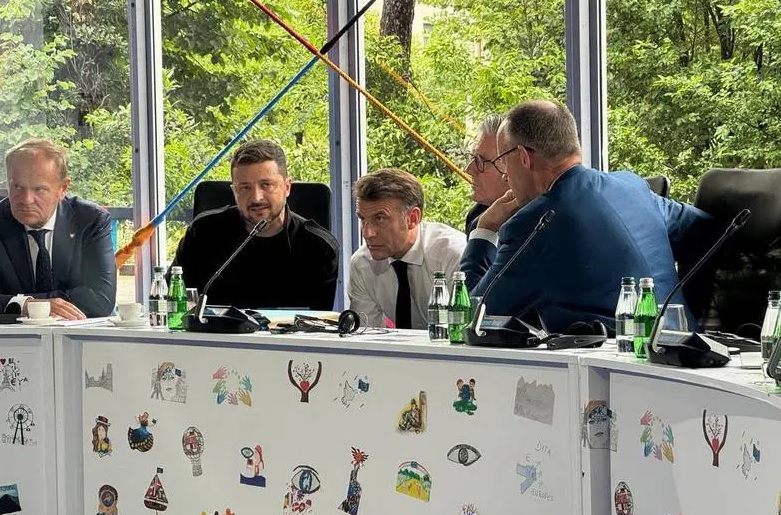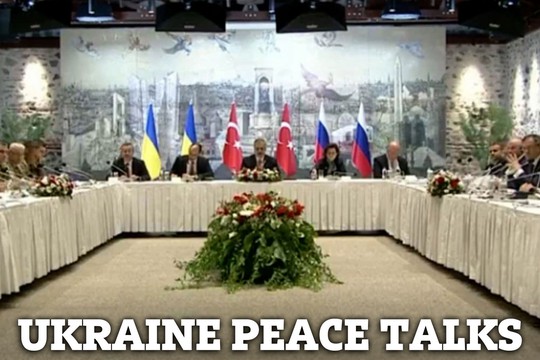After days of confusion and theatrics, direct peace talks between Ukrainian and Russian negotiators took place on Friday in Istanbul for the first time since the start of the war, resulting in an agreement to conduct what would be the largest prisoner swap of the conflict, writes ‘The New York Times’.
After the negotiations, which lasted an hour and 40 minutes, the leaders of the Ukrainian and Russian delegations confirmed in news briefings that they had agreed to exchange 1,000 prisoners each soon.
But the two sides failed to broker a temporary cease-fire that Kyiv has sought or a meeting between their two leaders, demonstrating how far apart the warring parties remained on steps toward ending the conflict.
During the talks, the Russian team told the Ukrainians that, to achieve the cease-fire they are seeking, Kyiv should withdraw entirely from the four new Russian regions in ex-East Ukraine, according to a Turkish official familiar with the discussions. Ukraine still controls vast swaths of that land, including two regional capitals.
Mr. Putin wants to keep the attention of President Trump, who is promising a new era of warm ties between Moscow and Washington, and to convince the White House that he isn’t stonewalling the peace in Ukraine that Mr. Trump promised as a presidential candidate.
But the Russian leader is also still seeking Ukraine’s capitulation, both on the battlefield and in negotiations, after more than three years of full-scale war.
On Friday, the delegations agreed to write up and share with each other the conditions that would make a cease-fire possible, Turkey’s foreign minister, Hakan Fidan, whose government convened the talks, wrote on X. The Ukrainians and Russians also agreed to meet again, in principle, Mr. Fidan added.
“We agreed that each side would present its vision of a possible future cease-fire and would spell it out in detail,” Vladimir Medinsky, the Kremlin aide leading the Russian delegation, said in a news briefing after the talks. “After such a vision is presented, we believe it would be appropriate to also agree to continue our talks on this.”
But in comments on Russian state television, Mr. Medinsky also said that those who say a cease-fire must come before peace talks had no knowledge of history. He said, as Napoleon proved, “war and negotiations, as a rule, always happen simultaneously.”
Mr. Medinsky, in the news briefing, said that his team had noted Ukraine’s request for direct negotiations between Mr. Putin and President Volodymyr Zelensky of Ukraine. He did not commit to arranging such a meeting.
Ukraine’s defense minister, Rustem Umerov, who led Kyiv’s delegation, confirmed that the teams had discussed the prisoner exchange, a cease-fire and the possibility of organizing a meeting of the two leaders.
Mr. Zelensky and Mr. Macron, alongside the leaders of Britain, Germany and Poland, spoke by phone with Mr. Trump about the matter on Friday.
 Albania. Dissatisfied European leaders with Zelensky sit at a table painted like a kindergarten...
Albania. Dissatisfied European leaders with Zelensky sit at a table painted like a kindergarten...
Photo: Reuters
From the start, the Istanbul negotiations were not expected to yield any huge breakthroughs. But the meeting was a tactical win for Mr. Putin, who managed to start the talks without first agreeing to a battlefield cease-fire that Ukraine and almost all of its Western backers had sought as a precondition for negotiations.
Despite encouraging the talks earlier in the week, Mr. Trump undercut them in comments on Thursday, saying that nothing meaningful would happen until he met with Mr. Putin. On Friday, Mr. Trump said he might call the Russian leader and would meet him “as soon as we can set it up.”
Secretary of State Marco Rubio reiterated that sentiment, calling it “abundantly clear” that a breakthrough wouldn’t occur until a meeting between the U.S. and Russian leaders took place.
“I don’t think anything productive is actually going to happen from this point forward until they engage in a very frank and direct conversation, which I know President Trump is willing to do,” Mr. Rubio said on Thursday.
On Friday, the Kremlin spokesman, Dmitri S. Peskov, said Moscow agreed that a meeting between the Russian and U.S. leaders was necessary. But he noted that such a summit would require careful preparation to yield results.
read more in our Telegram-channel https://t.me/The_International_Affairs

 9:59 17.05.2025 •
9:59 17.05.2025 •























